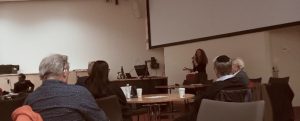By Matty Maslen, Newsletter Editor
Earlier this month, I was invited to attend the Holocaust Memorial Day Ceremony at the University of Bradford, organised by the Peace Studies department. This was the sixth consecutive year that the department had gathered to remember the victims of the Holocaust, and of all genocides since then.
The theme for Holocaust Memorial Day 2024 was ‘Fragility of Freedom’. At the University of Bradford, this was honoured by a panel discussion featuring Professor Paul Rogers, Tom Woodhouse, Professor Udy Archibong, Dr Becky Alexis Martin, community members, and students of the Peace Studies department.
In 1942, Rafael Lemkin, a Polish-Jewish lawyer coined the term ‘genocide’. In 1948, the ‘Convention and Punishment of the Crime of Genocide’ officially codified genocide as an independent crime. Yet, in the past century, there have been 27 genocides across the world.
 In reflecting on these, the speakers talked about why genocide has occurred so many times. Dr Becky Alexis-Martin spoke of imperialistic necropolitics: the entanglement of the use of power to “dictate how some people must live and some must die”, with imperialism and colonial legacies. As Professor Udy Archibong said, “racism, hatred and discrimination fuelled these genocides”.
In reflecting on these, the speakers talked about why genocide has occurred so many times. Dr Becky Alexis-Martin spoke of imperialistic necropolitics: the entanglement of the use of power to “dictate how some people must live and some must die”, with imperialism and colonial legacies. As Professor Udy Archibong said, “racism, hatred and discrimination fuelled these genocides”.
After each of the key speakers had done a short presentation, there was time for questions. Gathering during the current atrocities in Palestine was extremely potent, and one of the most interesting discussions which took place was in response to the question: ‘What do we pragmatically do to protect staff and students?’
Discussion turned to the role of educational institutions in supporting their students through distressing and complicated times in the international sphere. Each member of the panel was speaking with different lived experiences of the current atrocities in Palestine. Yet, all the speakers agreed that the main responsibility of the Peace Studies department, and the university as a whole, to its students and staff is to foster an environment for dialogue.
As Prof. Udi had said earlier: “inclusion is not an afterthought, or something that is nice to do; it is something that is necessary”. Alson with Tom Woodhouse, she spoke of the need for there to be a safe space that allows for “ambivalence and contradiction”. A place where different points of view can be explored and discussed meaningfully. As Fiona Macaulay put it, the job of educators is to teach respectful dialogue and to teach students not to prescribe opinions or perspectives to other people. As Paul Rogers said, it is the “essential mark of a university” to be able to rise above personal feelings.
Dr Becky Alexis Martin summarised it well: universities can protect their staff and students and help prevent future genocides by keeping them informed, educated, and empowered.
The same is true of us all: we must seek facts, question norms, and stand up for what is right.
